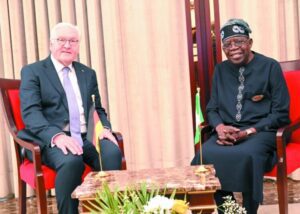


Under Tinubu, Federation Account records 45% revenue growth — RMAFC
…ICPC saved FG over N10bn in 2024, recovered N50bn since 2019 — Chairman
By Seun Ibiyemi
The Federation Account has witnessed a 45 percent increase in revenue since President Bola Ahmed Tinubu assumed office.
This is according to Chairman of the Revenue Mobilisation Allocation and Fiscal Commission (RMAFC), Dr. Mohammed Bello Shehu.
Speaking at a press briefing in Abuja on Tuesday, Dr. Shehu attributed this growth to the policies and reforms introduced by the Tinubu administration.
He described the reforms, including the proposed tax reform bills, as bold measures aimed at repositioning Nigeria’s revenue framework and addressing longstanding fiscal challenges.
Dr. Shehu acknowledged the difficulties facing Nigerians due to current economic challenges but admitted the long-term benefits of these initiatives
”We know there are challenges in the country, hardships, and other things, but at the end of it, this reform aims to position Nigeria among seriously developing countries. In the long run, the GDP is going to rise significantly,” he stated.
He praised President Tinubu for taking decisive action early in his first term, rather than delaying critical reforms.
“Mr. President is risking it all to implement these reforms now. This shows seriousness and a commitment to achieving tangible results. For too long, we have been passing the buck,” Dr. Shehu remarked.
Dr. Shehu also used the occasion to debunk reports suggesting RMAFC’s opposition to the proposed tax reform bills.
He described such reports as “grossly misleading, false, and malicious,” emphasising that the Commission has been an active participant in the reform process.
“We applaud President Tinubu’s strong commitment to repositioning Nigeria’s revenue base through bold initiatives.
“The proposed tax reform bills are a significant step toward integrating untapped revenue sources, enhancing Nigeria’s revenue-to-GDP ratio, and positioning the country favorably among nations with high fiscal performance,” he said.
While recognising the debates surrounding Value Added Tax (VAT) allocation and derivation, Dr. Shehu assured Nigerians of the Commission’s commitment to aligning with global best practices.
He revealed that RMAFC has submitted a memorandum emphasising adherence to these standards to guide the reform process.
The RMAFC chairman disclosed that the proposed tax reforms are undergoing extensive consultations with expert bodies to ensure the legislation is robust, equitable, and effective.
“The Commission is a critical stakeholder in Nigeria’s fiscal framework, and we take our responsibility to provide expert advice seriously. We are working closely with the National Assembly to ensure the proposed bills align with global best practices,” Dr. Shehu noted.
Dr. Shehu condemned the spread of misinformation, stressing that the Commission’s professional advice should not be misinterpreted as opposition.
“It is disheartening to note that, despite our explicit support for the proposed legislation, some individuals have chosen to peddle falsehoods for reasons best known to them. These inaccurate statements can undermine the efforts of patriotic Nigerians tirelessly working to support the President’s vision,” he said.
He urged the media to uphold ethical standards, cautioning against the dissemination of baseless reports.
The reforms aim to enhance fiscal equity, reduce tax evasion, and increase revenue generation while addressing concerns about potential impacts on businesses and individuals.
Dr. Shehu called on Nigerians to rally behind President Tinubu’s bold fiscal reforms, describing them as a crucial step toward economic prosperity.
“At this critical juncture, the President needs the support of all Nigerians. Let us work together to support his vision for a more prosperous Nigeria,” he urged.
The RMAFC also appealed to the media to focus on promoting factual and constructive dialogue in the national interest.
With these reforms, the Tinubu administration aims to strengthen Nigeria’s fiscal foundation and build a sustainable path toward economic growth and development.
Meanwhile, the Chairman of the Independent Corrupt Practices Commission (ICPC), Dr. Musa Adamu Aliyu, has revealed that the Commission saved the federal government over N10 billion in 2024 and recovered more than N50 billion between 2019 and 2023.
Dr. Aliyu made this disclosure while delivering the keynote address at the International Center for Investigative Reporting (ICIR)’s Open Contract Reporting Project (OCRP) close-out and journalism awards ceremony held in Abuja on Tuesday.
He noted that the ICPC has tracked over 1,500 projects nationwide
“When we asked MDAs to bring out their procurement plan, the ICPC found out that most of the MDAs executing projects do not have the mandate to do so. When we look at what is happening in the public sector, it is very sad because many people are out to divert public funds. We have had a case where somebody spent N7 million on a project that couldn’t have cost more than N100,000. He went on to say I have taken it, and what can you do about it? Let’s go to court. It is as bad as that.”
Aliyu stressed the need to strengthen oversight mechanisms in order to rigorously enforce the procurement law, because “when you look at it, most of the procurements process, they don’t strictly comply with them because there is laxity in the oversight mechanism.”
He also called for the empowerment of the citizens to enable the people know what is happening so that they can report to the appropriate agencies when they notice these lapses while harping on the need to have collaboration across all agencies.
“And also, we need to promote ethical leadership and lead by example in public service. One thing which I believe in is that if the head of an organisation, ministry or agency is straightforward, those down will follow. But if those working under you as a team executive know that you are not straightforward, when you give them one yard, they will take ten miles.
“Once we are transparent and straightforward as team executives, those under you will follow. But once the executive is not straightforward, then you have a problem and being straightforward has its own consequences. Because when you are straightforward, there are certain things that maybe you may not know, but at least they will be careful with what they do.”
The ICPC Chairman also applauded the ICIR for its Open Contract Reporting Project saying it has been very remarkable and has helped the Commission look into some projects they may not have been aware of.
“The OCRP is truly commendable and remarkable. It has significantly helped public institutions by highlighting some of the challenges within the public sector. Procurement fraud is a major issue that we all must address together. By reducing procurement fraud, we can free up resources that can be used for the development of the country.
Furthermore, the Deputy African Director of the MacArthur Foundation, Dr Amina Salihu applauded the journalists for their resilience stressing the need for everyone to pay attention and care about what is happening in the country.
“We owe this to the next generation, to ourselves, and to our own dignity. We cannot give up. Let us continue to do what we know best. Let us ask, fight, engage, demand, be present, and hold ourselves accountable. Because if we are not accountable, we cannot demand accountability.”
She praised the ICIR for successfully implementing the OCR project, which had trained 300 journalists and published 500 quality reports, describing it as a stellar achievement.
“We salute you for the work that you do. We look forward to what the future holds and how these potentials will come to fruition.”
The Executive Director of the ICIR, Dayo Aiyetan, explained that the Open Contract Reporting Project (OCRP) began seven years ago with the aim of holding government and organisations accountable, particularly in relation to procurement.
He noted that the project had trained 300 journalists across Nigeria in open contract reporting and had produced over 500 high-quality investigative reports from journalists nationwide.
“Seven years on, we have remarkable stories to share. We’ve inspired many journalists to take an interest in investigative journalism. I can confidently say that most of these journalists would not have pursued critical investigative reporting were it not for this project. It has made a real impact.”
Aiyetan expressed his gratitude to the MacArthur Foundation for their support in sustaining the project, ensuring that journalists had the resources needed to conduct vital investigative reporting. He also commended the collaboration of anti-corruption agencies and civil society organisations in supporting the project.



